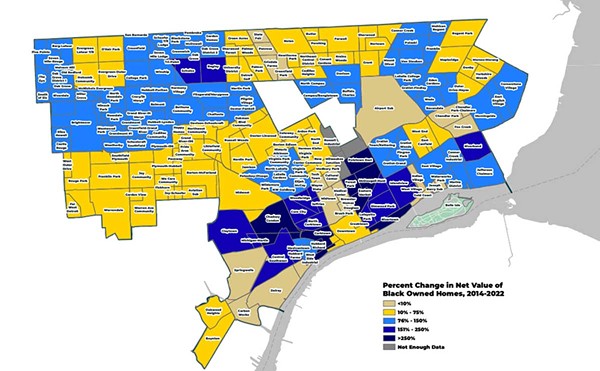
The Michigan State Board of Education passed a resolution Tuesday to counter the anti-critical race theory (CRT) bills introduced in the Legislature last year, but it didn’t happen without lengthy debate among board members and hours of public comment.
Tuesday’s meeting stretched nearly 10 hours due to hundreds of public comments.
There was an organized effort on social media among county Republican parties, including the Muskegon County GOP and the Oakland County GOP, to flood the public comment period. At one point in the meeting, there were over 650 people waiting to speak to the board, most of which were to argue against school mask mandates and CRT.
Critical race theory is a college-level theory that examines the systemic effects of white supremacy in America. Despite months of debate in Michigan and across the country, almost no Michigan’s K-12 schools teach the concept. Detroit Public Schools Community District Superintendent Nikolai Vitti said the district uses the basic tenets of the theory in social studies and other disciplines.
The resolution on “teaching comprehensive history,” introduced by Democrat Pamela Pugh, states that “teachers have the right and responsibility to teach the multifaceted and complex history including the history of race, racism and other biases, which are inextricably connected to the constitutional and statutory history in our country.”
Republicans and right-wing activists across the country have argued it’s controversial to teach the history of systemic racism in the U.S.Republican members in both the state House and Senate have introduced bills to limit what’s taught in K-12 schools.
(GOP member Tom) McMillin offered an amendment to the resolution, adding, 'Whereas based on the tenets of CRT, little white children in Michigan Public Schools are being told that they and their parents are oppressors and little Black children are being told that they are oppressed.'
Senate Bill 460, introduced by Sen. Lana Theis (R-Brighton), explicitly bans “critical race theory” from being taught in schools and threatens to cut 5% of the school’s funding if the state determines that it is violating the law. House Bill 5097, introduced by Rep. Andrew Beeler (R-Port Huron), does not explicitly reference CRT, but prohibits schools from teaching any curriculum that includes the “promotion of any form of race or gender stereotyping or anything that could be understood as implicit race or gender stereotyping.”
Republican school board member Nikki Snyder said the resolution is an “artistic manipulation” of the bills.
Both Republican members on the board, Snyder and Tom McMillin, a former state House member, argued that the resolution teaches students to feel oppressed or bad about their race, but Democrats said it’s about bettering Michigan’s history curriculum.
“I believe we should be teaching our children the full breadth of U.S. history. It’s not to stigmatize, not to oppress, not to make some children feel better than others or worse than others. Not at all,” said state Superintendent Michael Rice. “But it’s so the children can wrestle with the complexity and multifacetedness of our history. It’s a powerful history, it’s a complex history. And in order to wrestle with it, kids have to learn it. They have to learn it all.”
McMillin offered an amendment to the resolution, adding, “Whereas based on the tenets of CRT, little white children in Michigan Public Schools are being told that they and their parents are oppressors and little Black children are being told that they are oppressed.”
The amendment failed, only garnering support from Snyder.
“The history lesson that students get taught in class on a K-12 level has been going on for decades about slavery. … African-American students have been taught that they have been oppressed for decades through history class. That’s not new,” said Democratic member Tiffany Tilley. “I think that we should teach children that this is history and that this happened between ancestors. And I think it should be taught also about how we continue to move forward so that things like this don’t happen again.”
Rice said the resolution is not about adding to the debate on CRT, but to ensure that Michigan students receive an adequate education on American history.
“If I were to give a history class to the august body within this room, you would struggle with it. You would struggle with it because your history instruction has been inadequate, including about race and racism, and how fundamental they are to our country’s history,” Rice said.
The resolution passed with a 5-1 vote.
Board passes on resolution requiring masks in schools
Another resolution was brought forth by Pugh to urge the state to require masks in schools, regardless of vaccination status, improve testing and contact tracing in schools, improve ventilation systems in older school buildings and require school staff to be vaccinated.
The board does not have the authority to impose mandates or directives, so resolutions are considered recommendations.
However, the resolution was not able to garner the support from other Democrats on the board in order to pass.
“While I strongly believe the vaccines would get us to community immunity, I have come to realize that, unfortunately, the COVID vaccines and the attempts to mandate them have now become the issue. We’re with the forest and the trees. That to me, is the tragedy at this point,” said Democratic member Judith Pritchett when explaining her no vote.
The board voted in August to adopt a resolution supporting local school districts’ decisions on mask mandates in K-12 schools this school year.
McMillin offered amendments to this resolution to include that the omicron variant is “no worse to the general population than a bad flu,” that children are more at risk of death “by drowning in a swimming pool than from any variant of COVID” and that Michigan’s current teacher shortage is due to “the bad government policies in response to the pandemic.” The amendments did not pass.
As of Tuesday, there are 617 cases of the fast-spreading omicron variant in Michigan since it was first detected in the state last month. While the symptoms associated with omicron are seemingly milder than other variants of the virus, it is still a serious concern because of its transmissibility, especially for the unvaccinated population. A large percentage of Michiganders who are hospitalized with COVID-19 are unvaccinated. Pediatric hospitalizations are also rising rapidly, according to the state.
The resolution failed with a 3-4 vote.
Originally published January 12, 2022 on Michigan Advance. It is shared here with permission.





